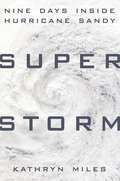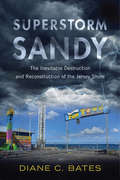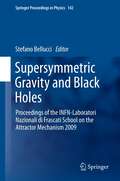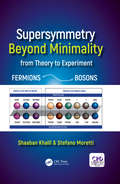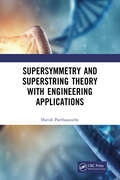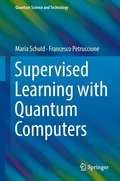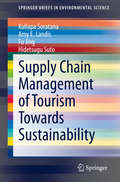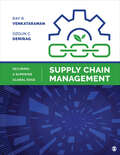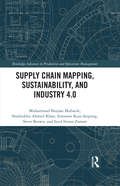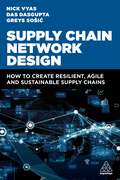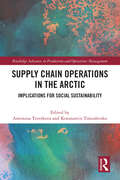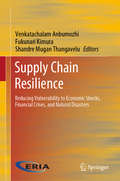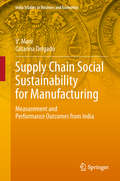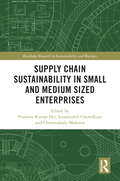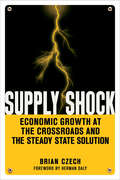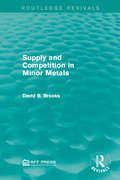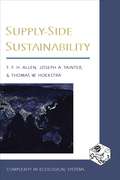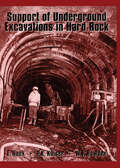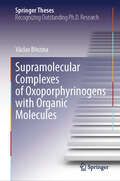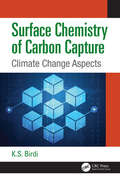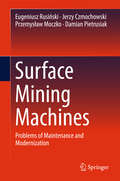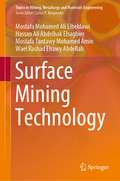- Table View
- List View
Superstorm
by Kathryn MilesThe first complete moment-by-moment account of the largest Atlantic storm system ever recorded--a hurricane like no other The sky was lit by a full moon on October 29, 2012, but nobody on the eastern seaboard of the United States could see it. Everything had been consumed by cloud. The storm's immensity caught the attention of scientists on the International Space Station. Even from there, it seemed almost limitless: 1.8 million square feet of tightly coiled bands so huge they filled the windows of the Station. It was the largest storm anyone had ever seen. Initially a tropical storm, Sandy had grown into a hybrid monster. It charged across open ocean, picking up strength with every step, baffling meteorologists and scientists, officials and emergency managers, even the traditional maritime wisdom of sailors and seamen: What exactly was this thing? By the time anyone decided, it was too late. And then the storm made landfall. Sandy was not just enormous, it was also unprecedented. As a result, the entire nation was left flat-footed. The National Oceanic and Atmospheric Administration couldn't issue reliable warnings; the Coast Guard didn't know what to do. In Superstorm, journalist Kathryn Miles takes readers inside the maelstrom, detailing the stories of dedicated professionals at the National Hurricane Center and National Weather Service. The characters include a forecaster who risked his job to sound the alarm in New Jersey, the crew of the ill-fated tall ship Bounty, Mayor Bloomberg, Governor Christie, and countless coastal residents whose homes--and lives--were torn apart and then left to wonder . . . When is the next superstorm coming?
Superstorm Sandy
by Diane C. BatesSandy was the costliest hurricane in U.S. history after Katrina, but the waters had barely receded from the Jersey coast when massive efforts began to "Restore the Shore." Why do people build in areas open to repeated natural disasters? And why do they return to these areas in the wake of major devastation? Drawing on a variety of insights from environmental sociology, Superstorm Sandy answers these questions as it looks at both the unique character of the Jersey Shore and the more universal ways that humans relate to their environment. Diane C. Bates offers a wide-ranging look at the Jersey Shore both before and after Sandy, examining the many factors--such as cultural attachment, tourism revenues, and governmental regulation--that combined to create a highly vulnerable coastal region. She explains why the Shore is so important to New Jerseyans, acting as a key cultural touchstone in a state that lacks a central city or even a sports team to build a shared identity among the state's residents. She analyzes post-Sandy narratives about the Jersey Shore that trumpeted the dominance of human ingenuity over nature (such as the state's "Stronger than the Storm" advertising campaign) or proclaimed a therapeutic community ("Jersey Strong")--narratives rooted in emotion and iconography, waylaying any thought of the near-certainty of future storms. The book also examines local business owners, politicians, real estate developers, and residents who have vested interests in the region, explaining why the Shore was developed intensively prior to Sandy, and why restoration became an imperative in the post-storm period. Engagingly written and insightful, Superstorm Sandy highlights the elements that compounded the disaster on the Shore, providing a framework for understanding such catastrophes and preventing them in the future.
Supersymmetric Gravity and Black Holes
by Stefano BellucciThis book is based upon lectures presented in the summer of 2009 at the INFN-Laboratori Nazionali di Frascati School on Attractor Mechanism, directed by Stefano Bellucci. The symposium included such prestigious lecturers as S. Ferrara, G. Dall'Agata, J.F. Morales, J. Simón and M. Trigiante. All lectures were given at a pedagogical, introductory level, which is reflected in the specific "flavor" of this volume. The book also benefits from extensive discussions about, and the related reworking of, the various contributions. It is the fifth volume in a series of books on the general topics of supersymmetry, supergravity, black holes and the attractor mechanism.
Supersymmetry Beyond Minimality: From Theory to Experiment
by Shaaban Khalil Stefano MorettiSupersymmetry (SUSY) is one of the most important ideas ever conceived in particle physics. It is a symmetry that relates known elementary particles of a certain spin to as yet undiscovered particles that differ by half a unit of that spin (known as Superparticles). Supersymmetric models now stand as the most promising candidates for a unified theory beyond the Standard Model (SM). SUSY is an elegant and simple theory, but its existence lacks direct proof. Instead of dismissing supersymmetry altogether, Supersymmetry Beyond Minimality: from Theory to Experiment suggests that SUSY may exist in more complex and subtle manifestation than the minimal model. The book explores in detail non-minimal SUSY models, in a bottom-up approach that interconnects experimental phenomena in the fermionic and bosonic sectors. The book considers with equal emphasis the Higgs and Superparticle sectors, and explains both collider and non-collider experiments. Uniquely, the book explores charge/parity and lepton flavour violation. Supersymmetry Beyond Minimality: from Theory to Experiment provides an introduction to well-motivated examples of such non-minimal SUSY models, including the ingredients for generating neutrino masses and/or relaxing the tension with the heavily constraining Large Hadron Collider (LHC) data. Examples of these scenarios are explored in depth, in particular the discussions on Next-to-Minimal Supersymmetric SM (NMSSM) and B-L Supersymmetric SM (BLSSM).
Supersymmetry and Superstring Theory with Engineering Applications
by Harish ParthasarathyThis book introduces the vast subject of supersymmetry along with many specific examples of engineering applications, for example: • The design of quantum unitary gates using supersymmetric actions.• Bosonic and Fermionic noise in quantum systems using the Hudson-Parthasarathy quantum stochastic calculus.• Superstring theory applied to the quantum mechanics of neurons and supersymmetric quantum filtering theory which can, for example, be used to filter out the noise in a cavity resonator electromagnetic field produced by the presence electrons and positrons in a bath surrounding it.• Simplified versions of super-Yang-Mills theory with gauge and gaugino fields, both transforming under the adjoint representation of the gauge group and elementary super-gravity models have also been introduced. All through the book, emphasis is laid upon exploiting the supersymmetry existing in the nature of Boson-Fermion exchange in designing engineering systems like quantum computers and analyzing the performance of systems in the presence of supersymmetric quantum noise.
Supervised Learning with Quantum Computers (Quantum Science and Technology)
by Maria Schuld Francesco PetruccioneQuantum machine learning investigates how quantum computers can be used for data-driven prediction and decision making. The books summarises and conceptualises ideas of this relatively young discipline for an audience of computer scientists and physicists from a graduate level upwards. It aims at providing a starting point for those new to the field, showcasing a toy example of a quantum machine learning algorithm and providing a detailed introduction of the two parent disciplines. For more advanced readers, the book discusses topics such as data encoding into quantum states, quantum algorithms and routines for inference and optimisation, as well as the construction and analysis of genuine ``quantum learning models''. A special focus lies on supervised learning, and applications for near-term quantum devices.
Supply Chain Management of Tourism Towards Sustainability (SpringerBriefs in Environmental Science)
by Kullapa Soratana Amy E. Landis Fu Jing Hidetsugu SutoThis book discusses applied life cycle and supply chain management approaches for the sustainable development of tourism in Asian countries. The book describes the current state of the tourism industry in Asia from a perspective of sustainability, and analyzes the trade-offs between the three pillars of sustainability (environment, society, economy) as they pertain to the implementation of sustainable tourism. In 5 chapters, this book offers guidance for students, researchers and corporations interested in applying sustainability in tourism related activities.Chapter 1 introduces readers to the life cycle and supply chain approaches to driving sustainable development in tourism, and discusses the need for these strategies in the face of current issues with the tourism industry in Asia. Chapter 2 provides more details on the role of life cycle approaches in the sustainable development of tourism, including proper practices and implications. Chapter 3 presents how knowledge and best practices among stakeholders in the tourism sector can be shared. Chapter 4 discusses how promoting sustainable tourism can improve tourists' experience, and chapter 5 concludes the book by addressing how life cycle and supply chain approaches can be used together for tourism enterprises.
Supply Chain Management: Securing a Superior Global Edge
by Ray R. Venkataraman Ozgun C. DemiragSupply Chain Management: Securing a Superior Global Edge takes a holistic, integrated approach to managing supply chains by addressing the critically important areas of globalization, sustainability, and ethics in every chapter. Authors Ray Venkataraman and Ozgun C. Demirag use a wide variety of real-world cases and examples from the manufacturing and service sectors to illustrate innovative supply chain strategies and technologies. With a focus on decision-making and problem-solving, Supply Chain Management provides students with the tools they need to succeed in today’s fiercely competitive, interconnected global economy. Included with this text The online resources for your text are available via the password-protected Instructor Resource Site. Learn more.
Supply Chain Management: Securing a Superior Global Edge
by Ray R. Venkataraman Ozgun C. DemiragSupply Chain Management: Securing a Superior Global Edge takes a holistic, integrated approach to managing supply chains by addressing the critically important areas of globalization, sustainability, and ethics in every chapter. Authors Ray Venkataraman and Ozgun C. Demirag use a wide variety of real-world cases and examples from the manufacturing and service sectors to illustrate innovative supply chain strategies and technologies. With a focus on decision-making and problem-solving, Supply Chain Management provides students with the tools they need to succeed in today’s fiercely competitive, interconnected global economy. Included with this text The online resources for your text are available via the password-protected Instructor Resource Site. Learn more.
Supply Chain Mapping, Sustainability, and Industry 4.0 (Routledge Advances in Production and Operations Management)
by Steve Brown Muhammad Shujaat Mubarik Sharfuddin Ahmed Khan Simonov Kusi-Sarpong Syed Imran ZamanDuring the COVID-19 pandemic, supply chain (SC) mapping appeared as one of the critical SC capabilities that could make a striking difference in organizations’ SC performance and improve sustainable operations. Despite its crucial role in responding to SC disruptions, there is a void in the literature on this topic. This book aims to address this gap demonstrating the importance of SC mapping, sustainability in the Industry 4.0 era. The book explores how SC mapping contributes to sustainability from social, economic, and environmental perspectives, the role of SC mapping in upstream, midstream, and downstream SC sustainability, as well as the role of technology advancement and the impact of blockchain and Industry 4.0 in SC mapping. Adopting a multidisciplinary approach, this edited collection features international authors from a diverse range of disciplines including SC management, operations management, technology and innovation management, and sustainability. The book will be a valuable resource for global scholars, researchers, and upper-level students across operations, SC management, and logistics, as well as engineering and technology management.
Supply Chain Network Design: How to Create Resilient, Agile and Sustainable Supply Chains
by Nick Vyas Dr Das Dasgupta Professor Greys SošicThe traditional linear supply chain is no longer fit for purpose, and organizations must redesign their supply chains to become more customer-driven, agile, resilient and sustainable.Supply Chain Network Design shows how to design intelligent, agile supply chain networks in the age of geopolitical disruptions, fast-paced technological innovation and drive for more sustainable business. It outlines how to incorporate international relations and a global perspective into supply chain planning and actions and how to embed ESG and circular economy goals. It surveys the rapidly evolving technology landscape and how it impacts some companies and provides a competitive advantage to others. It also explores how to harness technologies such as robotic process automation, AI and machine-driven intelligence and the evolution of forecasting to demand sensing to enhance network design.Taking a global perspective, Supply Chain Network Design is supported by practical cases and examples and provides a consumer-driven lens that will help organizations evolve their networks from a traditional B2B to a B2B2C workflow. Covering both lessons learned and how to move forward, this will be an must-read for supply chain, logistics and distribution leaders, managers and analysts.
Supply Chain Operations in the Arctic: Implications for Social Sustainability (Routledge Advances in Production and Operations Management)
by Antonina Tsvetkova Konstantin TimoshenkoThe extant corpus of research on supply chain sustainability in the Arctic exhibits a conspicuous neglect of the social dimension, rendering it the most underprivileged among the three pillars of sustainability. A deep dive into the Arctic, this edited volume endeavors to fill this opulent lacuna by placing the unjustly forsaken concept of social sustainability at the forefront of supply chain management (SCM) research. By showcasing real-life case studies of supply chain operations, all in different industries and located in various Arctic regions, this book delves into the intricate interplay between business interests, political ambitions, and social issues. In response to the burgeoning demand for more in-depth empirical studies within the SCM landscape, it offers a compelling tapestry of experiences and candid views on the complexities of implementing socially sustainable and responsible policies in Arctic supply chains. Featuring contributions by 26 esteemed scholars worldwide, this collection proffers 13 thought-provoking and insightful chapters, arranged in a logical and coherent sequence that enables readers to follow a clear thread of argumentation. With abundant theoretical insights and empirical data, Supply Chain Operations in the Arctic: Implications for Social Sustainability will appeal to a wide range of readers keeping a close eye on Arctic operations and sustainable issues. It is a timely and essential resource for students and scholars of SCM and sustainability studies, as well as businesses, policymakers, Indigenous Peoples, and non-governmental organizations seeking to promote socially responsible supply chain practices in the Arctic.
Supply Chain Resilience: Reducing Vulnerability to Economic Shocks, Financial Crises, and Natural Disasters
by Venkatachalam Anbumozhi Fukunari Kimura Shandre Mugan ThangaveluThis book investigates individual companies’ and industries’ supply chain risk management approaches to identify risk drivers and verify effective risk-reduction measures and business continuity plans.Typically, supply chain risk assessments focus on normative guidelines based on single best practice examples or vulnerability events, and there has been little work exploring how the concepts of supply chain risk management and resilience are related. However, since this relationship has implications for developing integrated response strategies, a clear understanding of the possible consequences is a fundamental step in building socio-economic resilience along the supply chain.Against this background, the book addresses three main topics: firstly, it defines the conceptual and sectoral domains of supply chain risk management and resilience by examining the welfare effects of extreme weather events and other economic shocks on selected global supply chains. It then presents an in-depth analysis of the scope of public–private partnerships to tackle the risks, by empirically exploring supply chain risk effects and information management. Thirdly, it proposes a regional cooperation framework in the context of major supply chain vulnerability events such as disasters and global financial crises.
Supply Chain Social Sustainability for Manufacturing: Measurement and Performance Outcomes from India (India Studies in Business and Economics)
by V. Mani Catarina DelgadoThis book highlights a number of social sustainability issues at different stages of the supply chain, and demonstrates how these issues can be addressed by adopting social sustainability practices in the manufacturing supply chain. In the wake of emerging social issues in developing countries, research on social sustainability has gained importance for academics and practitioners alike. The three distinguishable social sustainability dimensions in manufacturing that emerge as a result of this research provide insights for supply chain managers and practitioners who might otherwise be unaware of what constitutes social sustainability. A better understanding allows supply chain managers to address these issues more appropriately to increase their supply chain competitiveness in the market. The book presents a social sustainability scale that can be used by practitioners to measure supply chain social sustainability to benchmark their supply chains globally. The research also helps academicians to gain an understanding of the social issues related to the manufacturing supply chain, while the social measures developed serve as reference material for policy-makers and sustainability experts in emerging economies.
Supply Chain Sustainability in Small and Medium Sized Enterprises (Routledge Research in Sustainability and Business)
by Prasanta Kumar Dey, Soumyadeb Chowdhury and Chrisovaladis MalesiosThis book examines the sustainability of supply chains in small and medium sized enterprises (SMEs), in developed and emerging economies. Drawing on contributions from experts in the field and examining case studies from a range of countries, including Thailand, Bangladesh, France, Spain, Austria and Greece, this book provides researchers and industry practitioners with guidance on how to make SMEs more sustainable through appropriate trade-offs between economic, environmental and social aspects. Over the course of the book, the authors examine the current state of sustainable supply chain practices, highlight the key issues and challenges, and identify critical success factors across different industries and geographical locations. They also explore how supply chain carbon footprints and effectiveness are measured, and navigate the delicate balance between reducing the carbon footprint whilst still ensuring enhanced productivity. Finally, the book reflects on how the circular economy model might facilitate higher sustainability of SMEs. Supply Chain Sustainability in Small and Medium Sized Enterprises will be of great interest to scholars and practitioners of supply chain management and sustainable business.
Supply Shock: Economic Growth at the Crossroads and the Steady State Solution
by Brian CzechPoliticians, economists, and Wall Street would have us believe that limitless economic expansion is the Holy Grail, and that there is no conflict between growing the economy and protecting the environment. Supply Shock debunks these widely accepted myths and demonstrates that we are in fact navigating the end of the era of economic growth, and that the only sustainable alternative is the development of a steady state economy.Starting with a refreshingly accessible, comprehensive critique of economic growth, the author engages readers in an enormous topic that affects everyone in every country. Publisher's Weekly favorably compared Czech to Carl Sagan for popularizing their difficult subjects; Supply Shock shows why.Czech presents a compelling alternative to growth based on keen scientific, economic, and political insights including:The "trophic theory of money"The overlooked source of technological progress that prevents us from reconciling growth and environmental protectionBold yet practical policies for establishing a steady state economy.Supply Shock leaves no doubt that the biggest idea of the 20th century – economic growth – has become the biggest problem of the 21st. Required reading for anyone concerned about the world our children and grandchildren will inherit, this landmark work lays a solid foundation for a new economic model, perhaps in time for preventing global catastrophes; certainly in time for lessening the damages.
Supply and Competition in Minor Metals (Routledge Revivals)
by David B. BrooksAn interest in the minor metals – termed "minor" as their annual production is relatively small – had been developing for many years. This study, first published in 1965, examines patterns of supply that can be identified as underlying the production of minor metals, and then uses these patterns to investigate the nature and degree of competition in the production of minor metals. This book will be of interest to students of environmental studies.
Supply-Side Sustainability (Complexity in Ecological Systems)
by Timothy Allen Joseph Tainter Thomas HoekstraWhile environmentalists insist that lower rates of consumption of natural resources are essential for a sustainable future, many economists dismiss the notion that resource limits act to constrain modern, creative societies. The conflict between these views tinges political debate at all levels and hinders our ability to plan for the future.Supply-Side Sustainability offers a fresh approach to this dilemma by integrating ecological and social science approaches in an interdisciplinary treatment of sustainability. Written by two ecologists and an anthropologist, this book discusses organisms, landscapes, populations, communities, biomes, the biosphere, ecosystems and energy flows, as well as patterns of sustainability and collapse in human societies, from hunter-gatherer groups to empires to today's industrial world. These diverse topics are integrated within a new framework that translates the authors' advances in hierarchy and complexity theory into a form useful to professionals in science, government, and business.The result is a much-needed blueprint for a cost-effective management regime, one that makes problem-solving efforts themselves sustainable over time. The authors demonstrate that long-term, cost-effective resource management can be achieved by managing the contexts of productive systems, rather than by managing the commodities that natural systems produce.
Support of Underground Excavations in Hard Rock
by E. Hoek P.K. Kaiser W.F. BawdenThe safe and economical construction of tunnels, mines, and other subterranean works depends on the correct choice of support systems to ensure that the excavations are stable. These support systems should be matched to the characterstics of the rock mass and the excavation techniques adopted. This expansive text explores the design of rockbolts, dowels, cable bolts and shortcrete for underground excavations in hard rock, and covers key topics including rock mass classification systems, and support design for overstressed rock.
Supramolecular Complexes of Oxoporphyrinogens with Organic Molecules (Springer Theses)
by Václav BřezinaMacrocyclic oxoporphyrinogen molecules combine the ability to form strong supramolecular complexes with organic compounds and the ability to absorb light. These properties allow high-sensitivity colorimetric detection of acids in solution in the presence of oxoporphyrinogen. Moreover, protonated oxoporphyrinogens show various molecular dynamic processes on the millisecond timescale. This book offers deep analyses of colorimetric, binding and kinetic properties of oxoporphyrinogen-acid complexes. A detailed introduction is given for: theory of supramolecular binding and chemical kinetics; NMR spectroscopy with emphasis on multi-state chemical exchange including derivation of analytical spectral lineshapes; UV/vis spectroscopy and analysis of UV/vis spectra, using singular value decomposition (SVD). Implementation of the derived models in Mathematica is also provided. The experimental part addresses SVD analysis of UV/vis spectra illuminating the effect of protonation on various oxoporphyrinogen derivatives and explaining the colorimetric response. Furthermore, analysis of chemical exchange lineshapes offers insight into the dynamic processes present in protonated oxoporphyrinogens. The various models and techniques described in this book are widely applicable for other systems.
Surf, Sand, and Stone: How Waves, Earthquakes, and Other Forces Shape the Southern California Coast
by Keith MeldahlSouthern California is sandwiched between two tectonic plates with an ever-shifting boundary. Over the last several million years, movements of these plates have dramatically reshuffled the Earth's crust to create rugged landscapes and seascapes riven with active faults. Movement along these faults triggers earthquakes and tsunamis, pushes up mountains, and lifts sections of coastline. Over geologic time, beaches come and go, coastal bluffs retreat, and the sea rises and falls. Nothing about Southern California's coast is stable.Surf, Sand, and Stone tells the scientific story of the Southern California coast: its mountains, islands, beaches, bluffs, surfing waves, earthquakes, and related phenomena. It takes readers from San Diego to Santa Barbara, revealing the evidence for how the coast's features came to be and how they are continually changing. With a compelling narrative and clear illustrations, Surf, Sand, and Stone outlines how the coast will be altered in the future and how we can best prepare for it.
Surface Chemistry of Carbon Capture: Climate Change Aspects
by K. S. BirdiSurface Chemistry of Carbon Capture: Climate Change Aspects provides comprehensive and up-to-date literature on carbon capture and storage (CCS) technology and delineates the surface chemistry of this process. Mankind is dependent on energy from gas, oil, coal, atomic energy, and various other sources. In all fossil fuel combustion processes, carbon dioxide (CO2) is produced (ca. 25 Gt/year). In the past few decades, we have observed a constant increase in CO2 content in the air (currently ca. 400 ppm [0.04%]). This book discusses the technology related to carbon (i.e., CO2) capture and sequestration (CCS) from fossil fuel energy plants, which is considered an important means of CO2 control. It also covers the adsorption/absorption processes of CO2 on solids and similar procedures to help address growing climate change concerns.
Surface Environments and Human Interactions: Reflections from Asia
by Rajib Shaw Rajat MazumderThis book describes the complex interplay between Earth's surface processes (erosion and sedimentation) and human interactions. Intensive as well as extensive research has been undertaken to infer modern sedimentation processes and to infer the mode of stratigraphic sequence building. However, the effort to understand the influence of sedimentation processes on society and the human impact on sedimentation is long overdue. This is a new upcoming multidisciplinary research field that is beyond the scope of leading traditional Earth and Environmental Science journals. To fill in the prodigious gap in the knowledge base, this book includes in-depth reviews and new data-based case studies from Asia, involving multidisciplinary research. It covers case studies of risk management of various hazards and risk management systems at regional, national, and local levels. The book proposes a comprehensive approach to reducing future risks by collaborating with various stakeholders and preparingfor the most effective responses towards complicated hazards, minimizing social damage. This publication will help researchers in the field of Environment and Earth surface processes, disaster risk reduction, and geoscientists to have a better idea of the current trend of research in the field and will provide updated synthesis on this important topic.
Surface Mining Machines
by Eugeniusz Rusiński Jerzy Czmochowski Przemysław Moczko Damian PietrusiakThis unique volume imparts practical information on the operation, maintenance, and modernization of heavy performance machines such as lignite mine machines, bucket wheel excavators, and spreaders. Problems of large scale machines (mega machines) are highly specific and not well recognized in the common mechanical engineering environment. Prof. Rusiński and his co-authors identify solutions that increase the durability of these machines as well as discuss methods of failure analysis and technical condition assessment procedures. "Surface Mining Machines: Problems in Maintenance and Modernization" stands as a much-needed guidebook for engineers facing the particular challenges of heavy performance machines and offers a distinct and interesting demonstration of scale-up issues for researchers and scientists from across the fields of machine design and mechanical engineering.
Surface Mining Technology (Topics in Mining, Metallurgy and Materials Engineering)
by Mostafa Mohamed Ali Elbeblawi Hassan Ali Abdelhak Elsaghier Mostafa Tantawy Mohamed Amin Wael Rashad Elrawy AbdellahThis book gives a brief history and a general overview of the state of surface mining technology with topics ranging from the principles to surface mining methods, systems, and pit planning design. It starts with the definition of surface mine and ends with land reclamation and mine closure. The following chapters address the basics of mineral economics, calculation of stripping ratio; exploitation of difficult parts of ore deposits, slope stability, controlling falls and slides in the surface mines, sorts of freight traffic, scrapers, bulldozers, and loaders. The book serves as a reference text for mining students, engineers, and geologists.
